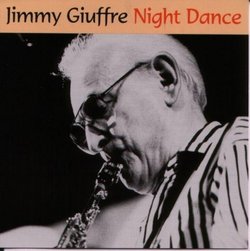| All Artists: Jimmy Giuffre Title: Night Dance Members Wishing: 0 Total Copies: 0 Label: Choice Original Release Date: 1/1/2005 Re-Release Date: 9/20/2005 Genres: Jazz, Pop Style: Cool Jazz Number of Discs: 1 SwapaCD Credits: 1 UPC: 708857100125 |
Search - Jimmy Giuffre :: Night Dance
 | Jimmy Giuffre Night Dance Genres: Jazz, Pop
|
Larger Image |
CD DetailsSimilar CDs
|
CD ReviewsAn overlooked mid-career return for this multireed master T. M. Orange | 07/23/2006 (5 out of 5 stars) "After recording and touring some of the most cool-toned yet innovative explorations in early-1960s jazz, multi-reed man Jimmy Giuffre was forced to disband his then-working trio (Paul Bley, piano and Steve Swallow, bass). This 2002 Candid CD reissue of a late 1971 recording for the Choice label marks Giuffre's return to the studio after nearly ten years -- with a new trio that is both more traditional than his previous one and yet also explores new terrain in Eastern tonalities.
After a remarkable series of mid-to-late 1950s recordings with his various drummerless trios for Capitol and Atlantic records (as well as a performance at the 1957 Newport Jazz Festival that opened the film Jazz on a Summer's Day), Giuffre recorded three masterpiece LPs with Bley and Swallow in 1961-1962: Fusion and Thesis for Verve (since reissued by ECM as the 2CD set 1961) and Free Fall for Columbia. Here was an approach to free improvisation -- cool, concise, and with a wonderful lyricism stemming from Giuffre's love of folk melodies -- that had little affinity with either the emotional exuberance of fellow Texan Ornette Coleman or the energy music that would follow the leads of Albert Ayler and John Coltrane. As Steve Swallow states in the liner notes for the Free Fall CD reissue, "Shortly after our return to New York, we began a residency in a coffee house on Bleecker Street, playing for whatever money was collected at the door. We disbanded on a night we each made 35 cents." Clearly the world was not ready for this music. And for whatever other reasons, Giuffre did not record again for nearly ten years. Which is why this reissue of Night Dance (an arguably better title than the original release: "Music for People, Birds, Butterflies and Mosquitos") is well worth hearing. Two facts immediately stand out here: first, with bassist Kiyoshi Tokunaga and percussionist Randy Kaye (about whom I have found little additional information), Giuffre turns to a traditional rhythm section for the first time since, near as I can tell, his self-titled Capitol leader debut of 1954. Second, Giuffre has taken up the tenor after his exclusive focus on clarinet (in Fusion, Thesis and Free Fall) as well as picked up the flute for (again, as near as I can tell) the first time. One way through these dozen tracks, then, is according to Giuffre's instrument of choice for each, and it's definitely the flute that wins out here (6 out of 12 tracks) with clarinet taking a back seat (only 2 tracks). But to start with the tenor tracks, it makes sense that in returning to his earlier horn Giuffre would make these the tunes that have the most traditional, swinging jazz melodies ("Night Dance," "The Chanting" and "Eternal Chant" in particular). With the remaining tenor track ("The Dervish"), however, Giuffre imparts to his folk melodies and improvisation a decidedly Eastern tonality, one that runs through much of the rest of this album. And as it turns out, Giuffre's light-toned tenor is perfect for the swirling, melismatic lines he spins. These, along with the flute and clarinet tracks, demonstrate Giuffre's characteristic folk melody sensibility stretching itself into Asian, Middle Eastern or simply non-occidental realms. Giuffre has found the perfect accompanists for his return to the studios. Tokunaga's simple bass figures sometimes ground Giuffre's solos and sometimes double the melodies; his arco work on "Feast Dance" and "The Bird" blend wonderfully with Giuffre's clarinet and flute repsectively. Kaye's playing is appropriately understated, but he also makes his presence felt when needed: the stop-time of "The Waiting" (the one tune that perhaps most resembles the Fusion/Thesis recordings), the gong that interjects regularly throughout the AB rondo swing of "Mosquito Dance," and the free tempo flute pieces ("The Butterfly" and "Flute Song") that nearly conclude the album and really provide its emotional focus and weight. In a review of the original LP for the allmusic guide, Scott Yanow calls the music "moody, fairly spontaneous, and melodic, but often wandering and rather insubstantial" and concludes that "the overall results are not too memorable." Such an assessment is, in my estimation, quite off the mark. If only for his return to recording after nearly 10 years, this CD would have merit; given that it marks a logical progression in Guiffre's explorations of the trio format, marked by his great gift for folk melody newly pushing into the terrains that we would now consider "world music," Night Dance has to rank very high. This may not be the best first Giuffre CD to pick up, but at the budget price it's not a bad second or third; for fans and collectors, it's essential." |

 Track Listings (12) - Disc #1
Track Listings (12) - Disc #1